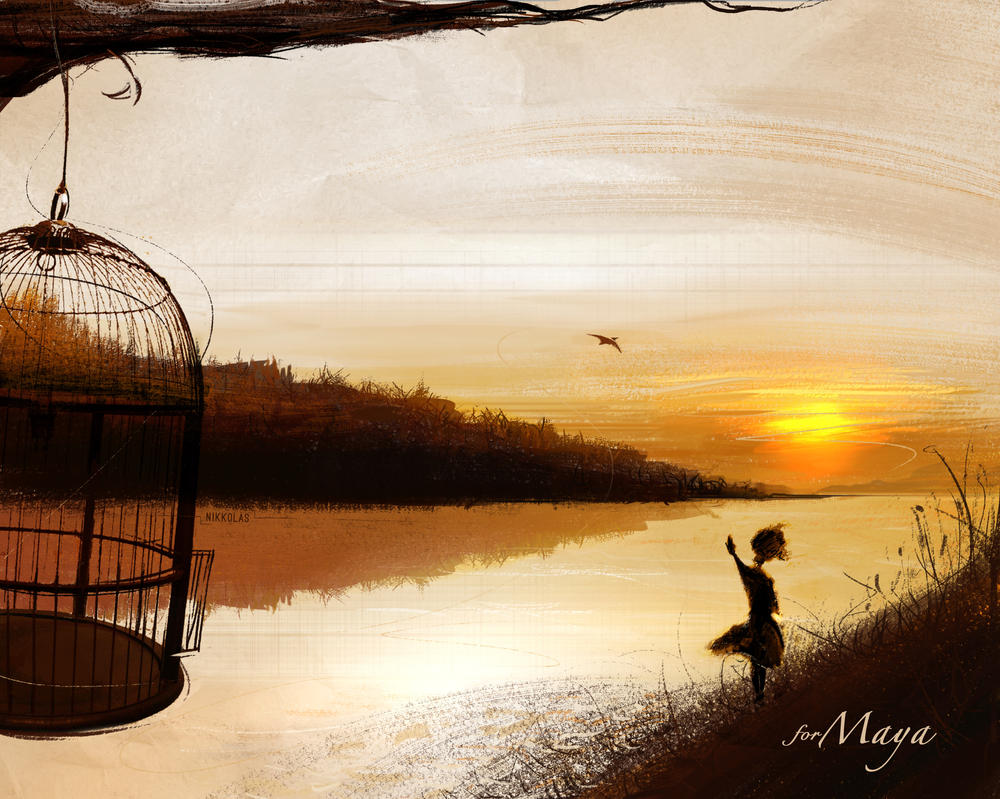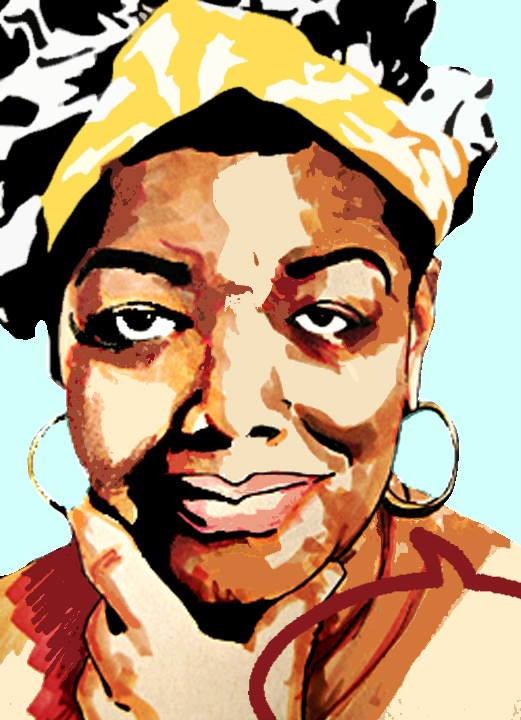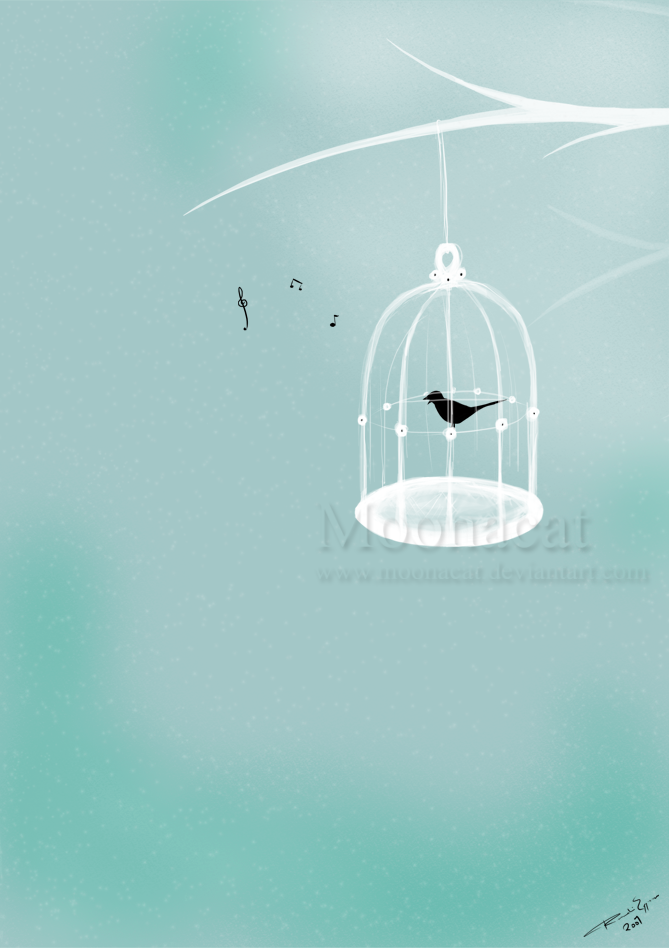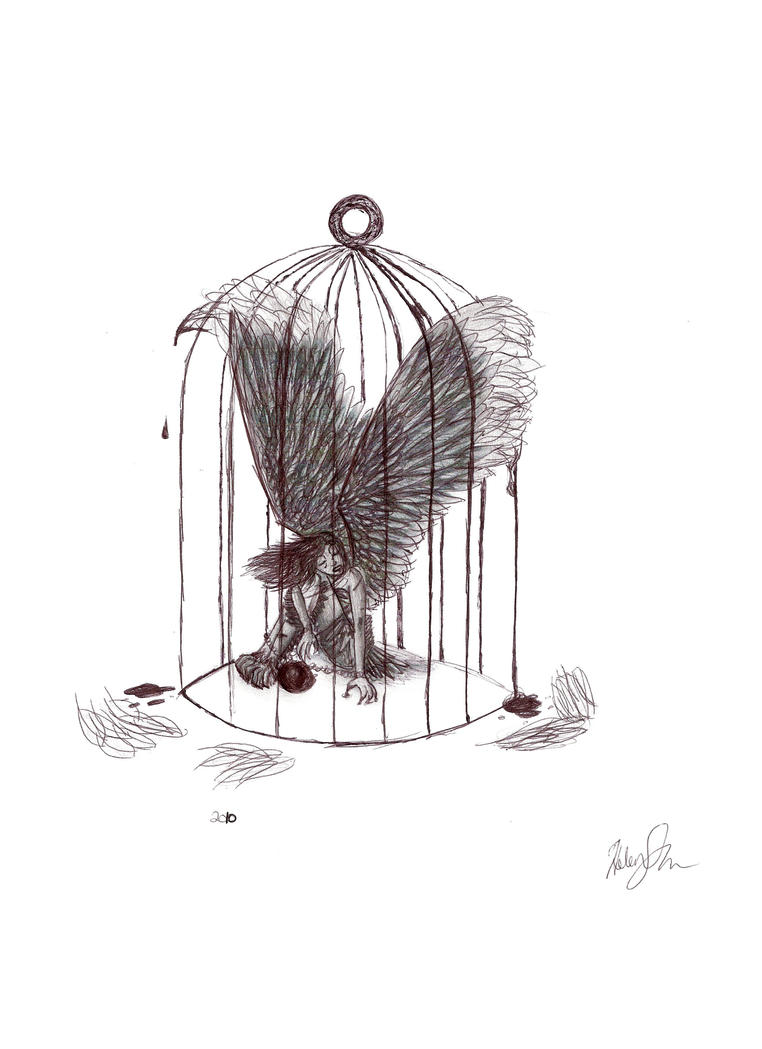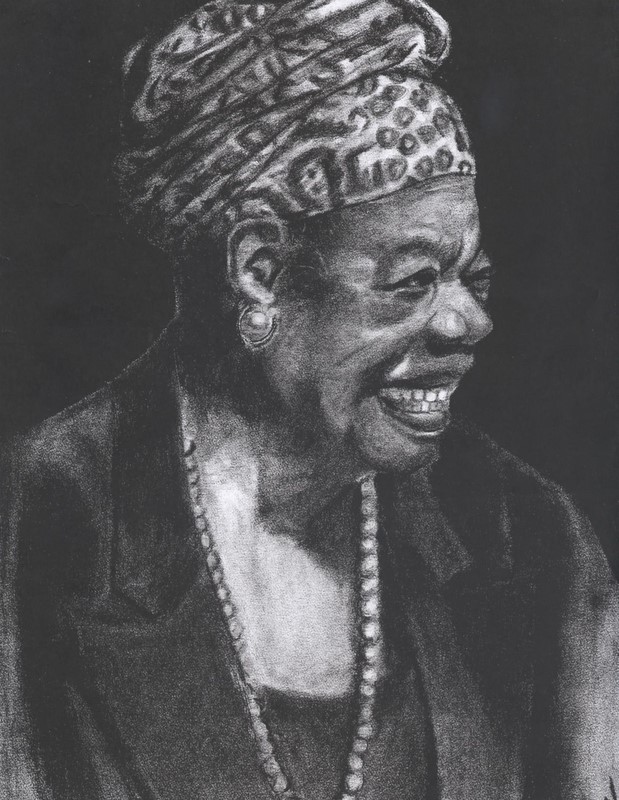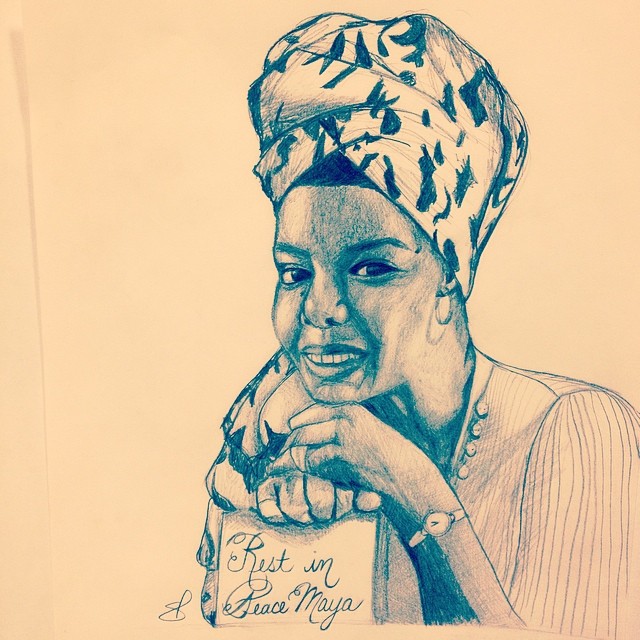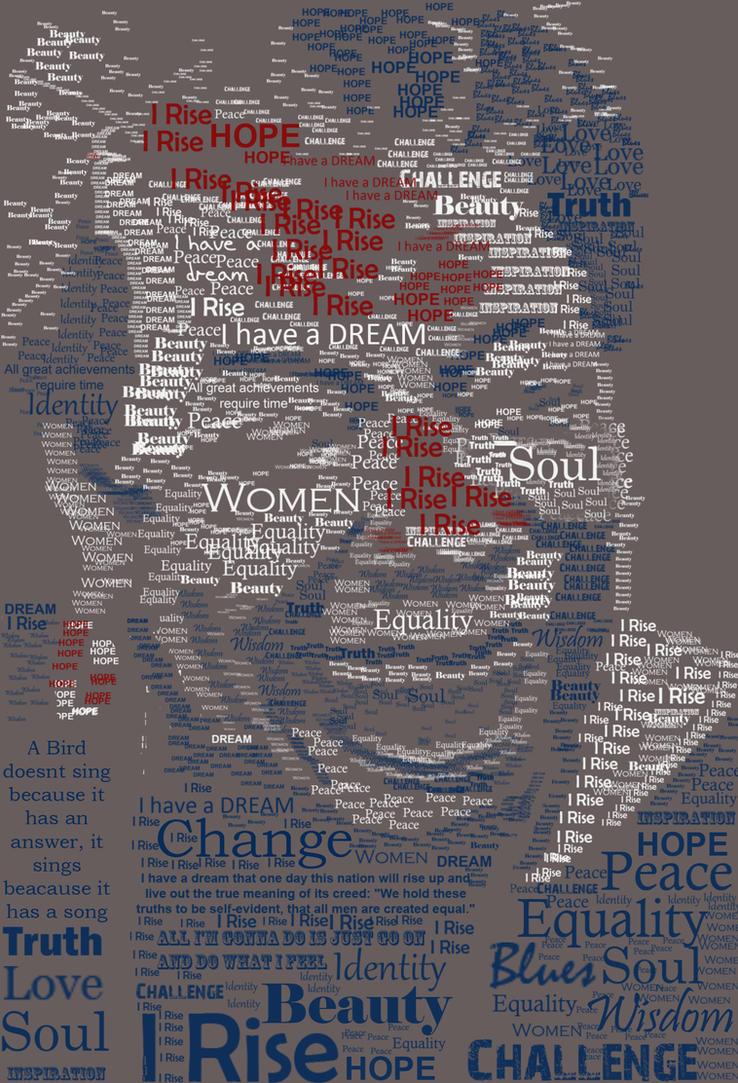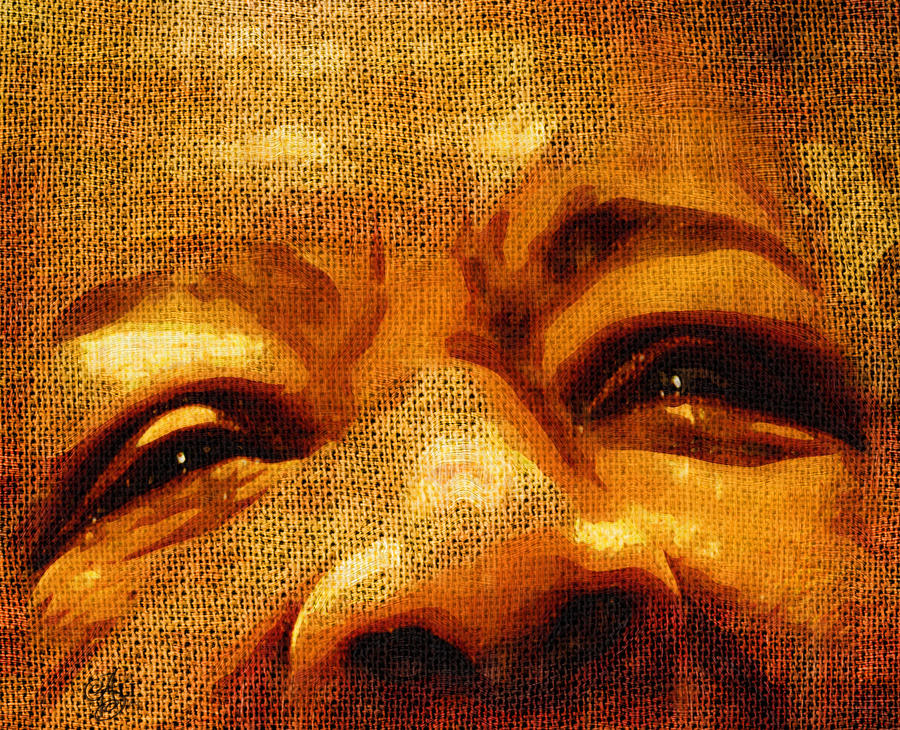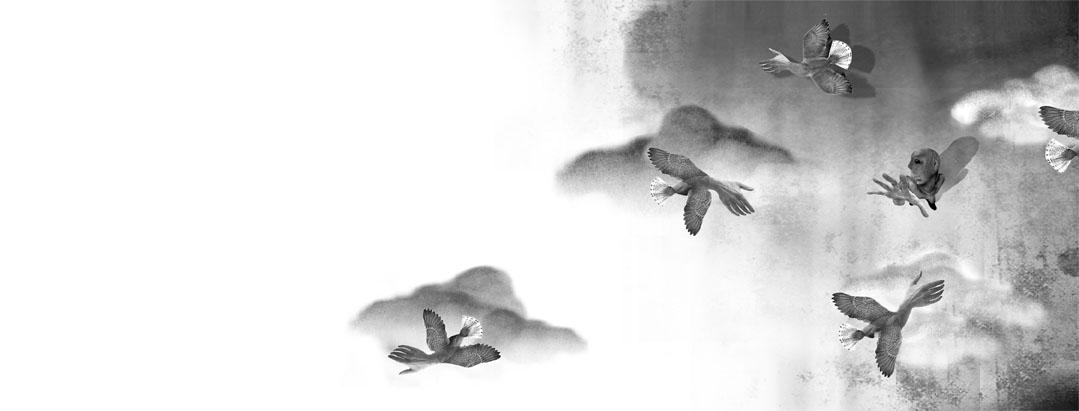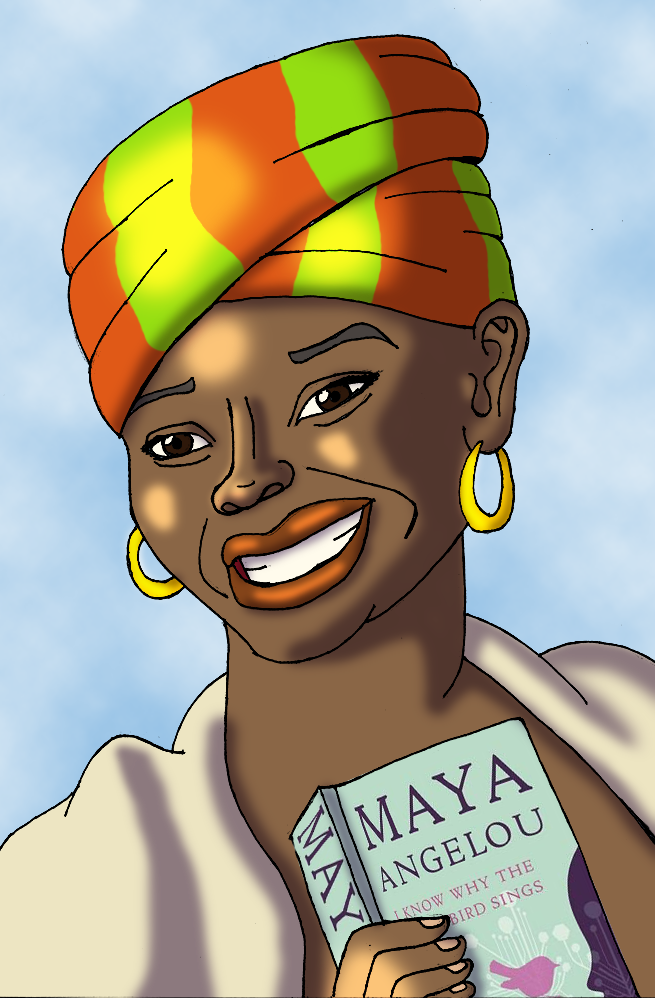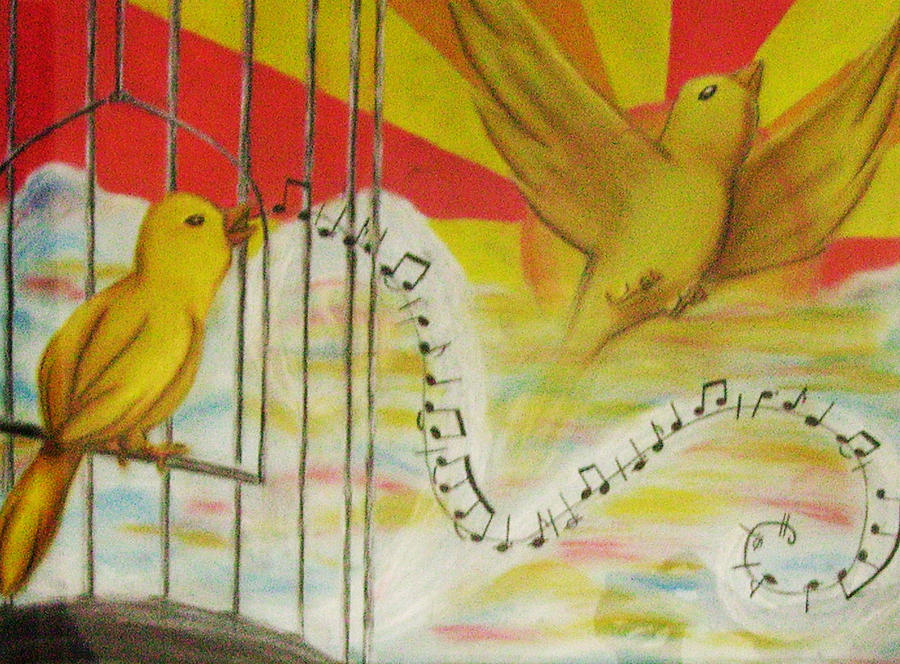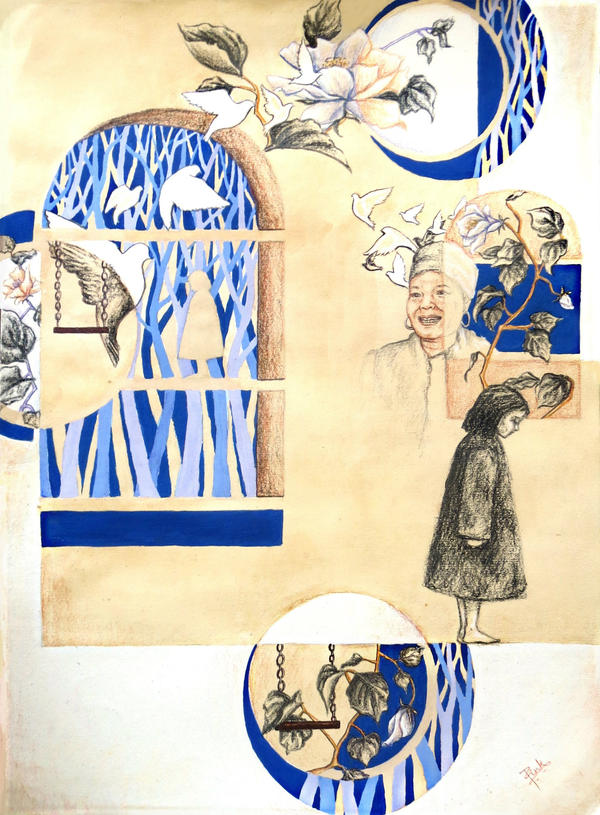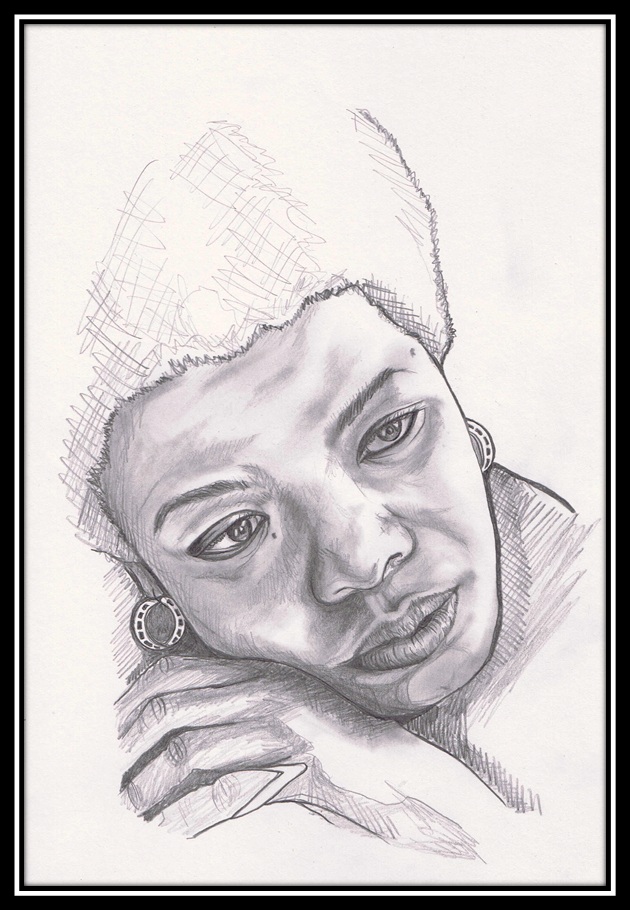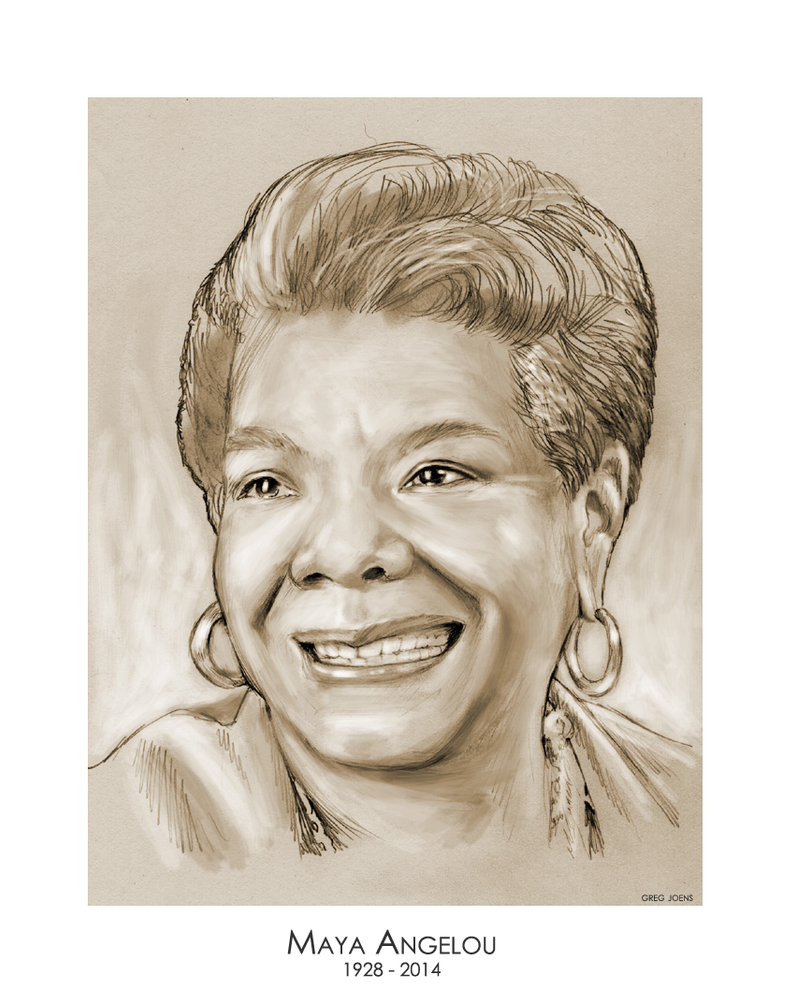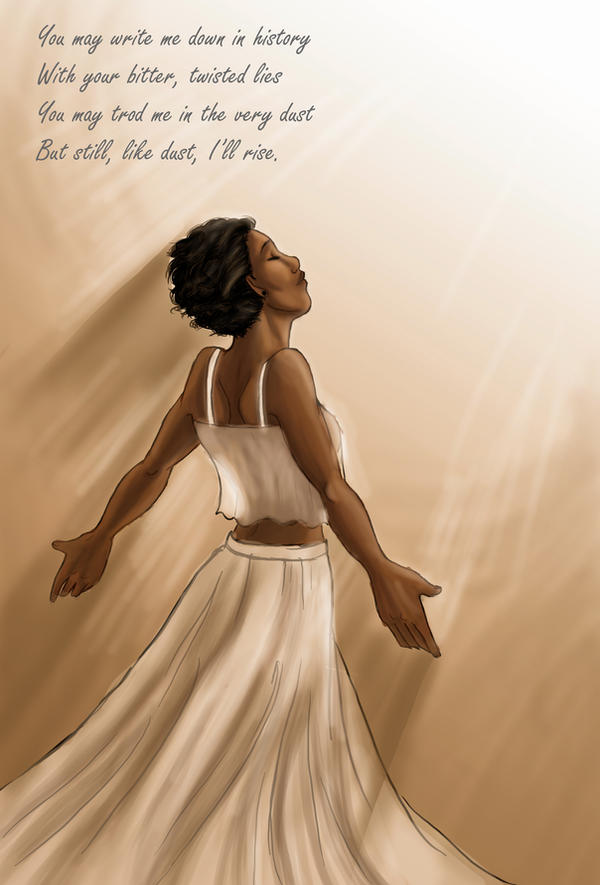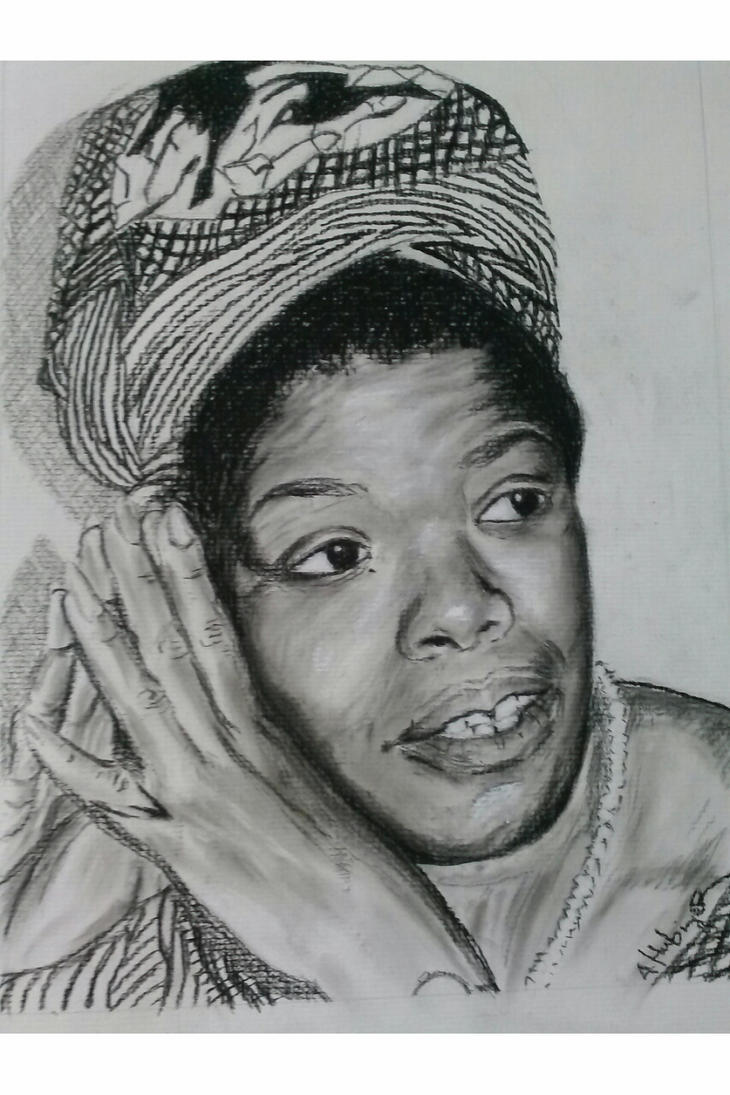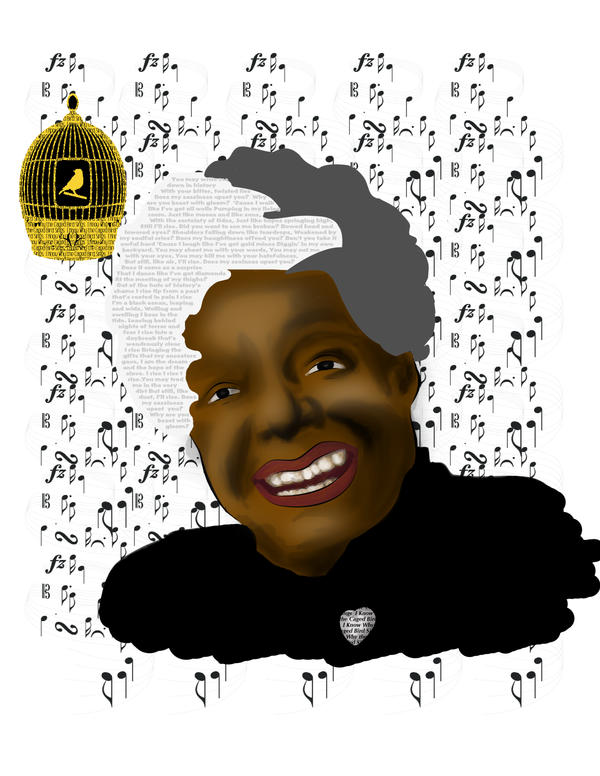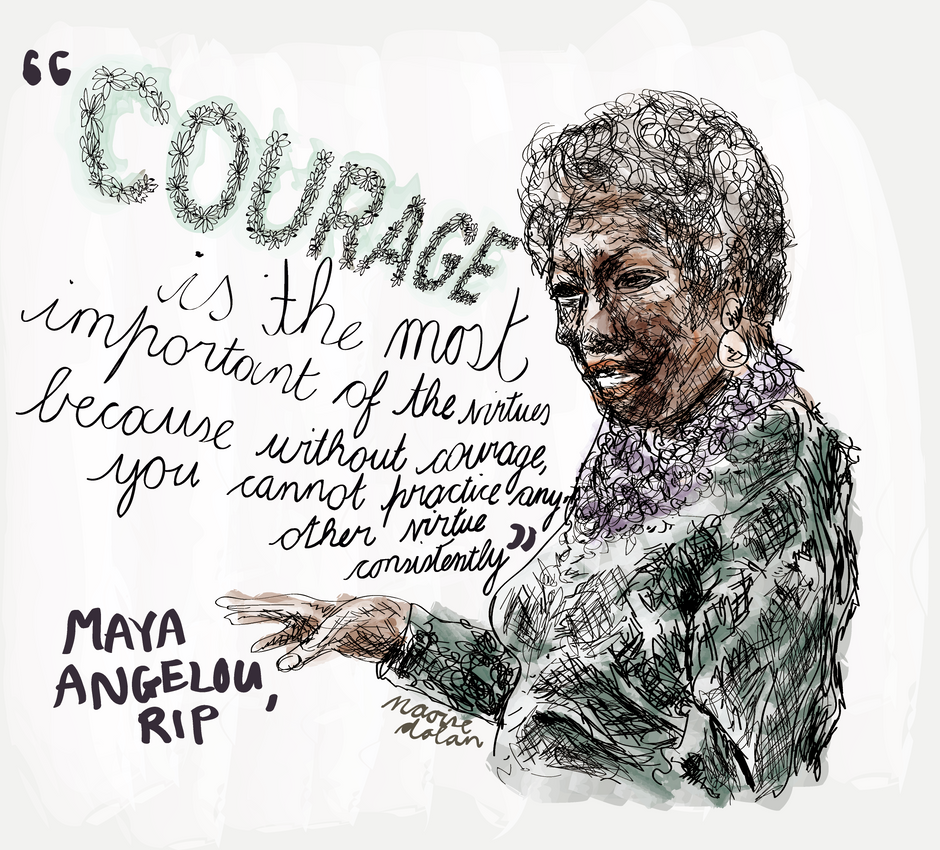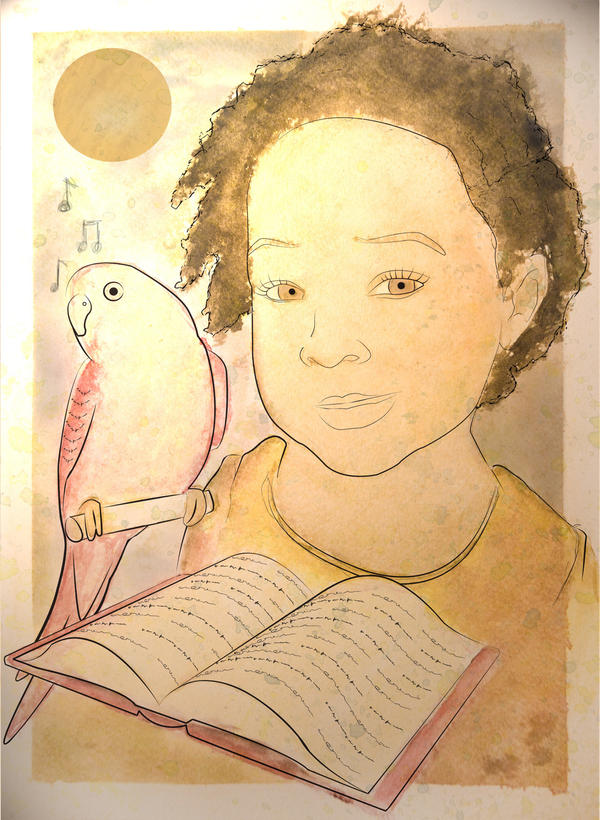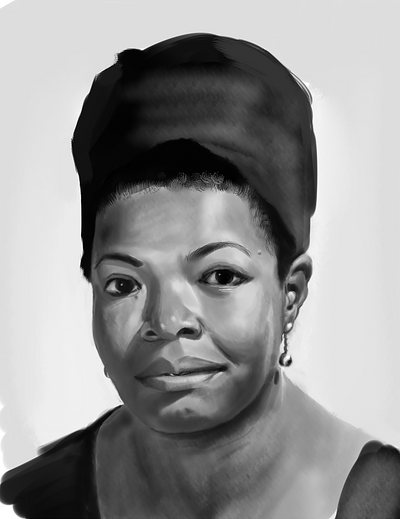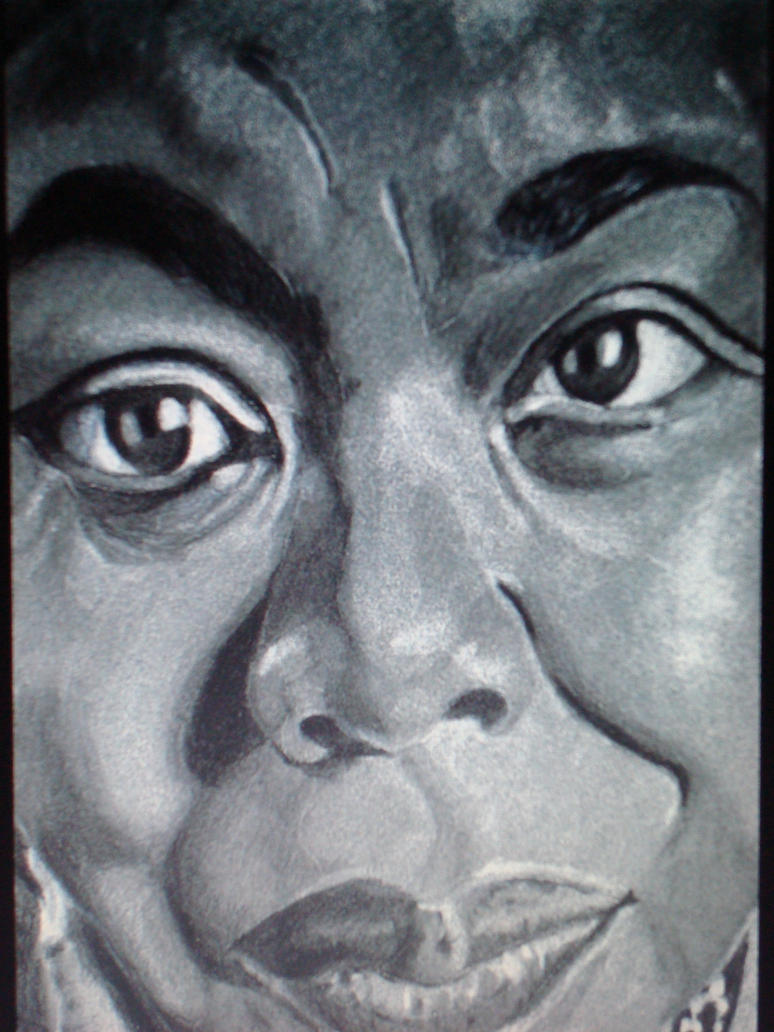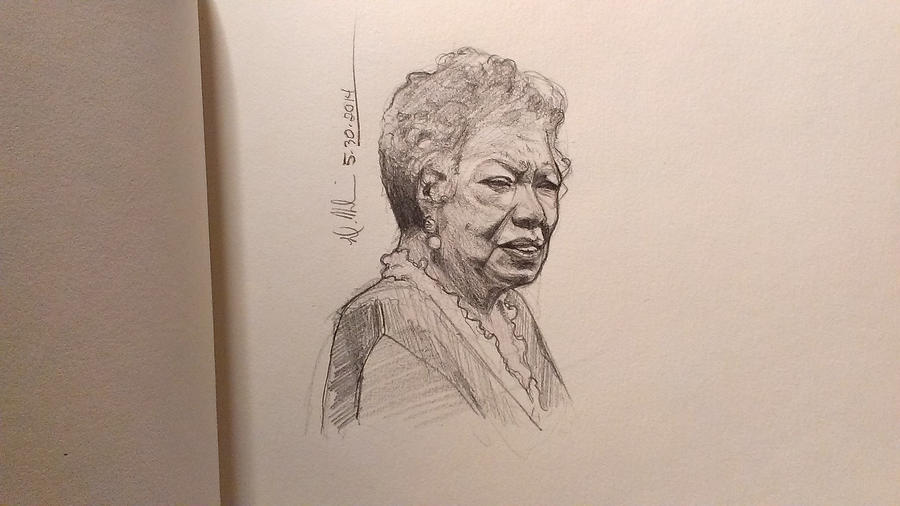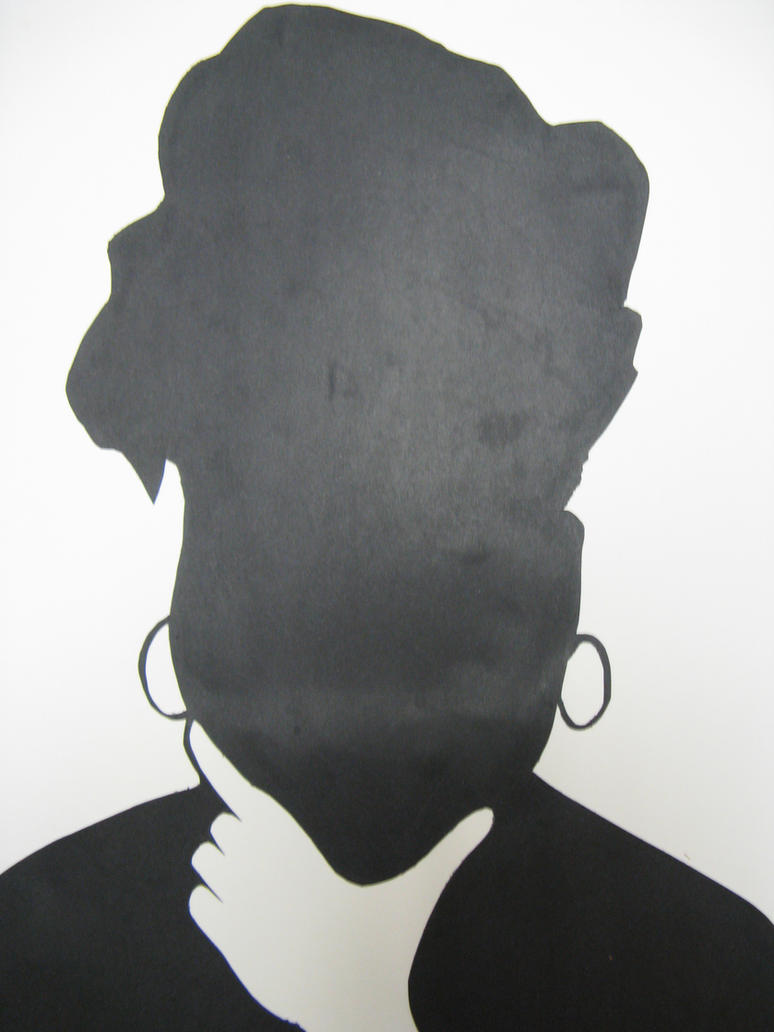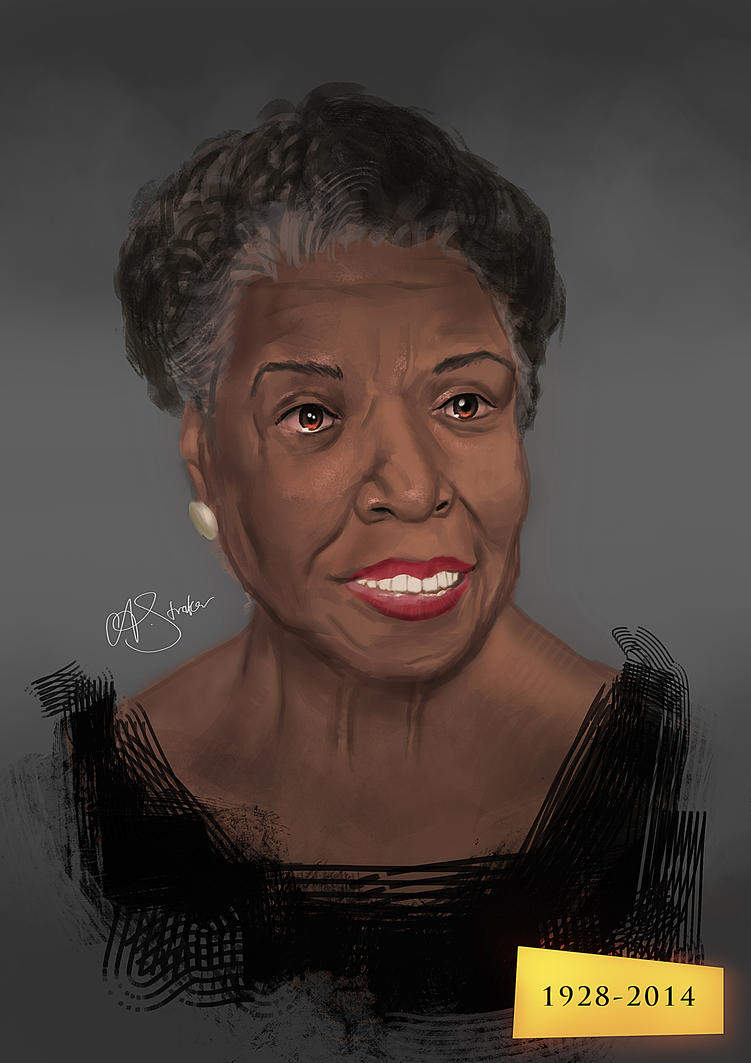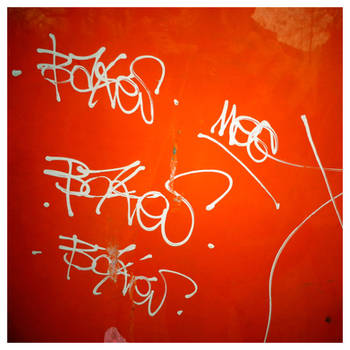Maya Angelou
Safe At Last.

About Artists on Writers
Writers will always find inspiration in the visions of artists, always feeling compelled to tell the stories behind the moments captured in artists’ unforgettable images,
Just as,
Artists will always find inspiration in the words of writers, always feeling compelled to lend visual reality and habitat to the characters described in the scribe’s haunting words.
Critics consider Maya Angelou’s most important writing to be her seven autobiographies, thinly disguised as novels, beginning with
I Know Why the Caged Bird Sings (1969). The depiction of her childhood rape, compounded by institutionalized racism, which serves as the core of her first book, has resulted in the work being regularly banned by schools and libraries, yet praised as a lifesaving resource by rape victims and counselors.
Reading
I Know Why… has become almost a rite of passage for teenaged girls. Her mother’s boyfriend raped her. Maya told her brother about the assault. The rapist was arrested and found guilty. He served his sentence of one day in jail. Justice awaited him upon release. In four days he was killed. Maya’s uncles were suspected. Young Maya’s psyche was gravely affected. She became mute, unable to speak for the next five years, knowing her voice, her words, had the power to kill.
Her respect for “the word” would evolve into her becoming not only a particularly sensitive and acute witness and observer of her life and times, but a writer and poet whose voice has inspired and changed the lives of generations of the oppressed and the rebellious.She would come to be friends with other masters of the written and spoken word who “moved mountains” with their voices:Martin Luther King, Malcolm X, and James Baldwin among others.
Maya went on to become a Renaissance woman of the working-class and lower depths of the Black American experience.Her resume reads as if written by Dante, but it’s accented throughout with the arts. Maya Anelou was a prostitute, but also a cast member of Porgy and Bess.She was a fry cook and a trolley-car conductor, but also a nightclub dancer and singer.In later life she became the Northern coordinator for the Southern Christian Leadership Conference, a leading organization in the American civil rights movement, and worked as a reporter doing dangerous duty in strife-riven Egypt and Ghana. She taught as a professor, received major recognition including the Presidential Medal of Freedom, the highest civilian award in the United States, and lectured internationally at colleges, churches and other venues incessantly, mostly about civil and human rights and poetry.It was as if she were making up for her years of being voiceless by never again allowing for even a moment’s silence when she could be continuing her conversation with her “prayer” for life.
An author of searing indictments against the injustices suffered by Blacks and the other groups of the American underclass, a firebrand activist during the Sixties, a radical feminist present at the birth of modern feminism, why is it that most Americans know of Maya Angelou only as “the poet” who read a poem at Bill Clinton’s inauguration? The answer would seem to be that in all the things Maya did and in all of the roles she assumed, the label of “poet” has always been the safest choice for polite society. Unlike Europe and throughout the Arab world, in America “poet” means a frail old man in a sweater at the library rasping the lines of what might as well be a dead language. Poets are not dangerous and upsetting in American culture. Poets are safe. To call Maya Angelou simply a “poet” is a missed appreciation on the scope of her art and the power of her revolutionary spirit.
But what of Maya’s many volumes of poetry? Her poetry is as much about actual survival as it is about the beauty of the poem as art. American academics label her poems “African-American anthemics,” meaning they are often written to be more the scripts for pieces of audience-involving performance art known as “call and response,” rather than lines on a page to be delicately dissected for hidden meaning. Her Audio Books are where you will find the amazing power of Maya Angelou’s poetry, far more than reading lines on the printed page. It is her voice, in all that a voice can be, that distinguishes her art.
With her death, at 86, last week, her books of poems are now artifacts of her life, which was itself a living poem - a once raging fire that has now been extinguished but lives on in our memories, in her words and in her voice.
It seems appropriate on deviantART to say with conviction, live your life as Maya Angelou lived hers and if you can, speak as she did.
featured poems by maya
passing time by maya anagelou
Your skin like dawn
Mine like musk
One paints the beginning
of a certain end.
The other, the end of a
sure beginning.
I Know Why The Caged Bird Sings
The free bird leaps
on the back of the wind
and floats downstream
till the current ends
and dips his wings
in the orange sun rays
and dares to claim the sky.
But a bird that stalks
down his narrow cage
can seldom see through
his bars of rage
his wings are clipped and
his feet are tied
so he opens his throat to sing.
The caged bird sings
with fearful trill
of the things unknown
but longed for still
and his tune is heard
on the distant hill
for the caged bird
sings of freedom
The free bird thinks of another breeze
and the trade winds soft through the sighing trees
and the fat worms waiting on a dawn-bright lawn
and he names the sky his own.
But a caged bird stands on the grave of dreams
his shadow shouts on a nightmare scream
his wings are clipped and his feet are tied
so he opens his throat to sing
The caged bird sings
with a fearful trill
of things unknown
but longed for still
and his tune is heard
on the distant hill
for the caged bird
sings of freedom.
byMaya Angelou
And Still I Rise by maya anagelou
Quotes from the Community & Featured Artwork
I remember reading I KNOW WHY THE CAGED BIRD SINGS
when I was 15 years old. It was assigned summer reading and I wasn't excited about it. I grew up in a small town in Maine. My high school was 96% white. I certainly wasn't expecting to connect with this book about a young black girl from the south growing up in abject poverty in a time that was far more bigoted than I could wrap my head around.
But I did. And the writing was compelling and beautiful and tragic and triumphant. I ended up reading her second memoir as well, even though it hadn't been assigned. My parents mailed it to me in France, where I was staying with a friend. I needed to read it that much -- it simply couldn't wait until I got back to the states, to my normal, every day suburban life. I felt close to Maya, this stranger from a completely different — and yet completely the same — place.
Today, I owe a lot to Maya Angelou, as a writer and as a citizen of the world. If you haven't read Ms. Angelou's memoirs yet, now is probably a good time."
Despite the many uplifting and inspiration quotes you'll find from Maya Angelou, what originally drew me to her was her book "I Know Why The Caged Bird Sings", which I originally only picked up for the interesting title. Afterwards I found her life, the way she built herself up and worked hard for everything had been inspiring to me for years.
Her powerful quotes are more than just preaching wisdom, she learned them first hand; she used her courage and has inspired so many of us.I didn't connect her as a person at first but with her writing - I didn't recognize her name, I couldn't have quoted a single quote for years, but after becoming more and more familiar, I realized how amazing she was, what she could teach and the endless amount of encouragement, love and drive she exhaled has always left me in a sense of awe, like "that's who I want to become".
In more recent years I don't think I've gone a week without seeing her quotes tweeted, shared or otherwise. Her legacy will continue with her words, such positive and uplifting words it's beautiful, she was a truly beautiful human being.
When I think about Dr. Angelou, what comes to mind most strongly is the notion of empathy. Her writing showed me not only the facts of what it was like to live as she did, but how it felt to live that way.
After reading about her experiences, I wasn't just informed about them, I empathized with them, and that has stuck with me even though I haven't picked up a book of hers in years.
And of course a wide-loving empathy was a trait she exemplified in her own life as an activist. To me that's shown most strongly in her views on the subject of gay rights, which she mentioned positively before that became a cause célèbre in the US. As someone who writes poetry, I was astonished to learn that the when former President Clinton asked Dr. Angelou to read a poem at his inauguration, it was the first time that had happened since Robert Frost was asked to do the same by Kennedy (a 22 year gap). That's an inspiration to all of us writers."
"I’ve learned that people will forget what you said, people will forget what you did, but people will never forget how you made them feel” - I won’t ever forget the power of Maya Angelou's words and how they made me feel, how they still make me feel.
She leaves a legacy of words behind her and ones that offer something for everyone at some point in their lives, as they may need it.
— Kaz-D
Maya Angelou never had an easy life, and some people would think some of her choices were shameful, but she never stopped being honest and authentic. She didn't hide herself away; she put it all out there in a style of writing that was completely raw and real. That honesty gave her an incomparable power and influence, and it's always been an inspiration to me."
— zippip
Maya Angelou's poetry is approachable and spiritual. She had the graceful candidness of an unyielding oracle that spoke up just as eloquently in times of turmoil as she did in times of joy."
— spoems
Maya Angelou must have secretly been a cat. One can't possibly experience, witness, inspire and be inspired so much in one single lifetime, but she did: she was able to live every day with an intensity that the majority of us will never comprehend, because the motivation and passion she had are somethingthatunique.
It's incredible to think that these nine lives she lived were so diverse, because if you think about it, most of us will stick to something and follow that specific passion; but each of her lives had its own driving passion, and she gave a bit of herself to each of them.
She wasn't just a singer and a dancer, she wasn't just an advocate for civil rights, she wasn't just an editor, a poet, a writer, she wasn't just one single thing - she was all of them, and that's what makes her special to me, all the things she did and all the passion she poured on them and the message she wanted to send out to the world. "
Maya Angelou, with that unique sound to her incredible voice, was one of the most important people to American history to me. She was a voice for the black community and all women. She was a wordsmith of the highest order and even had the honor of reciting her poem at President Clinton's Inauguration. She was the first to do this since the equally incredible Robert Frost.
And as a black person, a black woman, she showed people in our community anything was possible. And as an artist at that, a poet and writer, she was doing some of the most incredible things. She was a civil rights activist and even worked alongside Martin Luther King Jr. as well. I can go down the list of all of the accomplishments and accolades for this truly incredible woman but she has personally touched me through her art. Her literature is astounding and she's one of my main influences as a writer. There are very few woman like Maya Angelou.
So, I say: Rest in peace to one of the greatest and most influential artists and people to have ever graced the Earth. Maya Angelou, I think that highly of you and always will. I'm sure you're in a better place now, Marguerite Ann Johnson."
It's rare to find someone who's led such a tapestried life able to not only relate anecdotes, but also create moments we can all learn from and be inspired by it. Dr. Maya Angelou never rested on her laurels, and we can only hope to produce such luminaries in generations to come."
— neurotype-on-discord
To say Maya Angelou was a strong woman would be an understatement. She was a typhoon for equality and resilience, always proving to us that you can rise above your difficulties as long as you push forward."
— HugQueen
Maya Angelou took on several roles during her lifetime – and was truly the living embodiment of dignity, intelligence, loving spirit and unity.
Inspirational writers like her are far too few in this world. She was remarkable in how she reached into the hearts of millions, through the power of her soulful language. And, revolutionary in how she sparked passion through significant causes, to impact change and to make a difference.
Her literary finesse encourages me to pen heartfelt language to the page – igniting my own imaginative spark, to create everlasting bonds to my characters. And, when not fashioning fiction – to devotedly work towards advancing noble causes.Undoubtedly, she will continue to inspire."
The most important lesson Maya Angelou has taught us would be to never judge others based on what theyaren't. And that the written word, when supported by the courage of one's convictions, is powerful enough to bridge the deepest chasm and bring down the sturdiest of walls."
She should be remembered as one of America's greatest poets, as one of the world's greatest poets. Her skills were on par with Emily Dickinson, whose poems can be sung to the rhythms and tunes of popular songs, and William Shakespeare, who was hailed by even the French as an unrefined genius.
Her rhythms were at once so natural and so powerful, and her words so eloquent, that she could marry the baseness of human nature and the most lofty of human ideals in a way that can appeal to almost anyone. She was a trailblazer, setting precedents and achieving remarkable standing as U.S. President Bill Clinton's inaugural poet.
Yet she never once lost touch with her roots, which can be found in everything from her writings about slavery to her album of traditional Calypso music. Hers is a voice that shall continue to ring true long after death."
Maya Angelou was the writer I connected with as a teenager. I was one of those nerdy band and drama kids that was bullied ruthlessly while in high school. I remember eating lunch by myself in the stairwell and just reading her work to escape for a bit during the day.
Her words gave me hope then, and it gives me hope now. After I was diagnosed with ovarian cancer, I went back to reading her work for inspiration. She has helped me through some very tough times in life.
Her words transcend the negatives in the world, and I fully believe that it helped to shape me into the person I am today. Her death was a loss to the literary world, but I am certain she will continue to inspire generations to come.This quote of hers in particular has always been my favorite: "A wise woman wishes to be no one's enemy; a wise woman refuses to be anyone's victim."
Maya Angelou lived first and wrote second and in so doing she set an example for the rest of us. She reminded us that the full range of human emotion is powerful, important, and worth exploring. Her bravery and candor in sharing that exploration with us will be treasured far beyond her lifetime."
— LiliWrites
;
Passion. Grace. Courage. These inadequate words can only begin to describe Dr. Maya Angelou. She embodied her passionate beliefs and had the courage to pursue them. Few people can accomplish so much, with such grace and dignity. Her words, whether written or spoken, have influenced us for years, and will continue to do so. Thank you, Dr. Angelou."
I think what made Angelou so influential was her appeal to the every day person. She had words to resolve everything; quotes which people can apply to their lives and feel better for it. Her poems, a wonderful reflection of a fascinating life, she was an activist without aggression.One of my favourite quotes:"If you don't like something, change it. If you can't change it, change your attitude. Don't complain."
— BeccaJS
Maya Angelou's work was and is influential because she spoke toward self-betterment, of ideals of herself and the world around her, the intent of which any reader or listener can appreciate even though the words were driven by very specific incidents.
She taught readers to be proud of their strengths and accepting of their weaknesses, to better themselves without letting the negativity of others hinder them, and to bring happiness to everyone they meet.
Angelou's writing is the drive of a soul that saw potential for good, potential for strength, and potential for hope in the world."
— ikazon
The Triumph Project
Some of us in Community Relations invite you to participate in a new Project in remembrance of Dr. Angelou, one that grew out of a suggestion by Aeirmid. Together, we'll be creating art about triumph, be it personal, societal, or even hypothetical. At the end of the project, all deviations will be featured. This isn't a contest; it is a way for us to use our talents, following Dr. Angelou's example, to enrich our community.
What counts as triumphant? That's up to you. It could be a non-fiction biographical account of an historic leader, or an autobiographical poem about a personal moment of triumph. It could be a painting that captures a victorious feeling, or a photomanipulation that tells a story of triumph. Start with the theme of triumph, and see where it takes you!

Questions For the Reader
Did you ever attend a lecture by Maya Angelou? If so, what are your memories of her passion and fight?
Have you ever attended a poetry reading that turned into a genuine Call to Action or full-scale protest spilling into the streets?
What are your impressions with how teachers and professors teach poetry, especially the poetry of radical revolutionary poets, in classes you have attended?
Is the political or human message of a poem more important than a poem’s structure, or is the artistic crafting of the poem just as important?
Are there living, working published poets today whose poems have inspired you?

